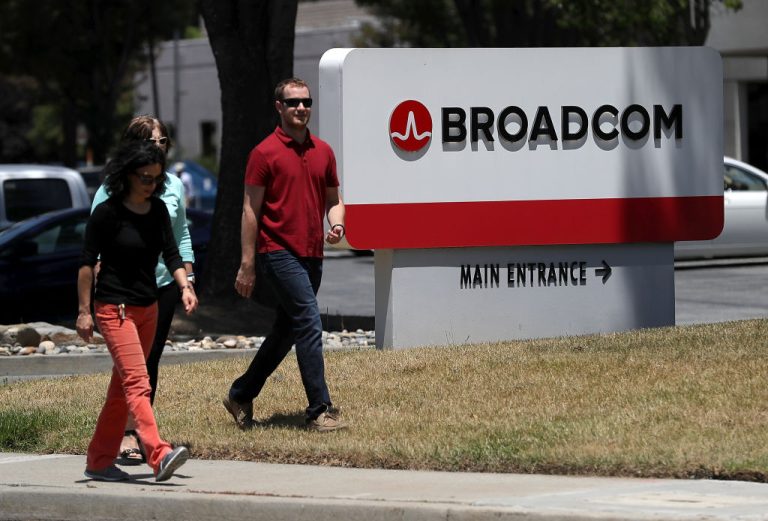Some manufacturing jobs are set to return onshore to America as the largest company in the world, Apple, announced it will begin producing 5G components on U.S. soil in a “new multiyear, multibillion-dollar agreement” with semiconductor manufacturer Broadcom.
The announcement was formally made in a May 23 press release on the Apple website, where the company stated Broadcom would begin manufacturing “5G radio frequency components — including FBAR filters — and cutting-edge wireless connectivity components.”
FBAR filters are “designed and built in several key American manufacturing and technology hubs,” including at the Broadcom facility in Colorado.
MORE ON THE TECH ECONOMY
- Qualcomm Says Smartphone Demand Collapsing at ‘Magnitude Greater’ Than Forecasted
- Apple Engineer Allegedly Stole Self-driving Car Secrets, Source Code, Before Jumping Ship to Baidu
- China Buys UK’s Largest Semiconductor Firm, Raising National Security Concerns
- IBM Freezes Hiring on Positions Such as Human Resources, Looking to Replace Them With AI
- Apple Has a Habit of Taking Advantage of Smaller Firms’ Innovation: WSJ Report
Apple stock took a 1 percent hit following the news amid what may be the beginning of a widespread U.S. equities market correction wave arising from uncertainty surrounding the federal government’s debt ceiling crisis.
Nonetheless, Broadcom stock enjoyed generous gains following the news, coming just shy of printing the $700 mark just days after setting a new all time high on May 19.
Success
You are now signed up for our newsletter
Success
Check your email to complete sign up
Broadcom’s market capitalization now stands at $286 billion and Apple’s at just shy of $2.7 trillion.
FBAR is an acronym for “film bulk acoustic resonator,” which are described as “made from piezoelectric material sandwiched together to create a network of resonating structures that resonate in the frequency range of 100 MHz to 10 GHz,” according to a 2018 informative published by the IEEE’s Spectrum.
The move comes amid a rush by Apple to extract production capacity from mainland China following operational disruptions arising from the toll waged by the Coronavirus Disease 2019 (COVID-19) pandemic and the Chinese Communist Party’s Zero-COVID social credit scheme, which widely disrupted both the employment and consumer sides of China’s economy.
Apple head Tim Cook was quoted in the press release as declaring the company holds “an unshakable belief in America’s future.”
The notion may be attributable at least in part to a multi-billion dollar spending package passed by Congress and signed by President Joe Biden at the end of 2022 called the Creating Helpful Incentives to Produce Semiconductors (CHIPS) for America Act.
An August of 2022 Fact Sheet on the passing of CHIPS published by The White House noted that the subsidies are not without their attached strings, such as “preventing companies from using taxpayer funds for stock buybacks and shareholder dividends.”
Moreover, CHIPS imposed “strong guardrails” that “ensur[e] that recipients do not build certain facilities in China and other countries of concern,” the Sheet stated.
In all, $39 billion will be handed out to stimulate domestic semiconductor manufacturing, and an additional $15 billion for R&D.
According to a 2022 Apple Supplier List, the company already utilized 32 U.S.-based companies, including a second Broadcom location in Pennsylvania and a third and fourth in Singapore and Taiwan.
Stimulus funding was likely a boon to preserving an 3.5 year agreement inked in January of 2020 shortly before COVID became an international affair to have Broadcom produce a portion of the wireless products used in Apple’s hardware.
An article by The Wall Street Journal at the time noted that “Apple accounted for roughly 20% of Broadcom’s net revenue in the year ended Nov. 3, and about 25% of revenue in fiscal 2018.”
Broadcom stock was worth a fraction of what it is today: approximately $320 in January of 2020 before falling to a low of $155 during the crash of the equities market amid COVID media hype and government lockdown measures.
The deal was something of a bailout for the company. In December of 2019, Broadcom was rumored to have contracted then-powerful Credit Suisse in an attempt to find a buyer for its wireless manufacturing segment, estimated at worth an optimistic $10 billion at the time, WSJ reported based on anonymous sources.
Apple enthusiast website 9to5Mac theorized at the time that Apple itself may have been the potential buyer based on the fact that Broadcom relied on Apple’s business for much of its revenue and murmurs that Apple had been looking at producing its own radio frequency components.
An article published by the Journal on the May 23 announcement stated, “UBS analysts said they estimate the new deal will run through 2026 and likely is valued at more than $15 billion.”
“The analysts added that the deal seems to quash speculation Apple would phase out Broadcom from its devices beginning in 2025, even if the iPhone maker continues with its effort to bring more key technology in-house,” it added.
The IEEE noted in its technical piece on FBARs that “fabrication of FBARs is challenging and small imperfections and process variations can impact the performance.”
A 2019 report by TechCrunch noted that the MacPro was the last piece of hardware that Apple completed its final assembly for within American borders at a Texas facility.
“We believe deeply in the power of American innovation. That’s why every Apple product is designed and engineered in the US, and made up of parts from 36 states, supporting 450,000 jobs with US suppliers, and we’re going to continue growing here,” Cook said at the time in a company press release.
A report by 9to5Mac at the time noted, however, that MacPro units destined for markets such as Europe were actually marked as Made in China, a similar approach used by Tesla with deliveries of its Model 3 to European customers as far back as October of 2020.
















